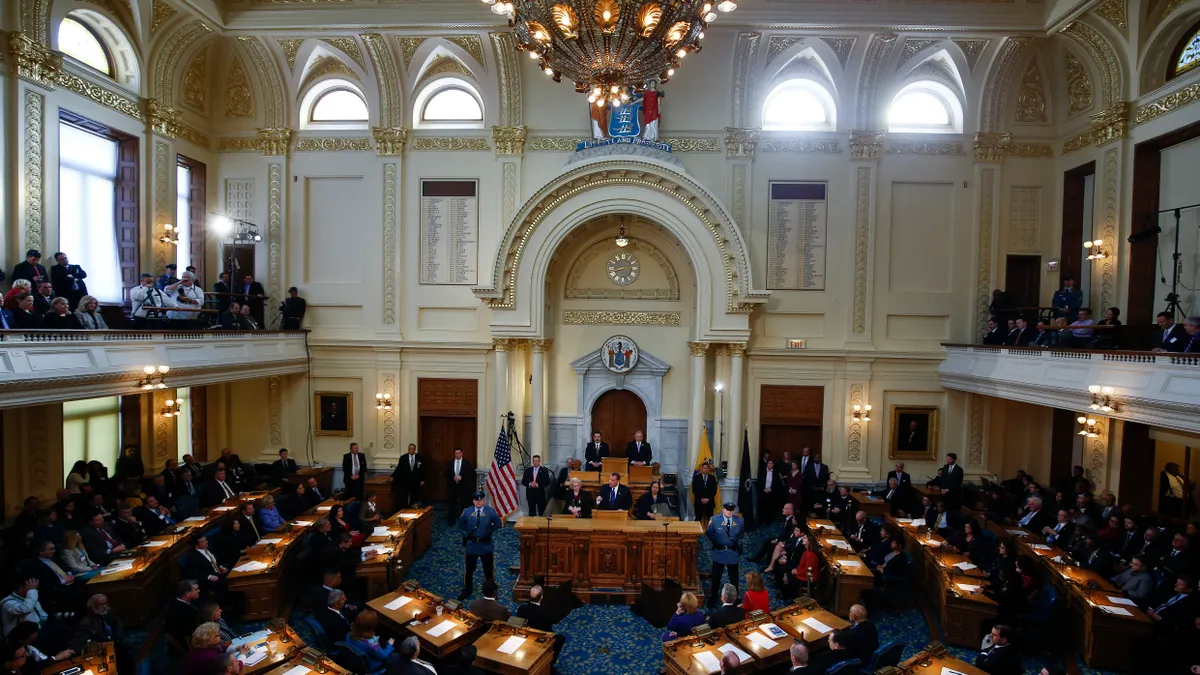Property and casualty insurers have devised a non-insurance-based proposal to cover lost business income in a future pandemic, but that won't help businesses that have been staggered financially beacuse of COVID-19, nor is it clear Congress will get behind what will surely be an expensive solution.
"Pandemics simply are not insurable risks; they are too widespread, too severe, and too unpredictable for the insurance industry to underwrite," said Charles Chamness, president and CEO of the National Association of Mutual Insurance Companies (NAMIC). "As we’ve seen in the past few months, pandemics are a national problem, and we need a national solution."
NAMIC, the American Property and Casualty Insurance Association, and the Big 'I', which represents independent insurers, last week released what they call the Business Continuity Protection Program (BCPP), which would let businesses buy short-term revenue replacement assistance from the federal government to cover payroll and other costs in a future pandemic.
Lawsuits pending
The proposal comes as property and casualty insurers face increasing demands from businesses to make good on business interruption insurance claims.
Owners of restaurants, stores, and other businesses hit hard by mandatory closures have been at loggerheads with insurers over whether business interruption insurance policies entitle them to proceeds to help them get through the downturn.
"We pay so much insurance, we think it should be able to kick in," said Jean-Georges Vongerichten, who owns several dozen Manhattan restaurants and estimates he's paid more than $25 million in business-interruption insurance over the last decade.
But insurers say many of these policies exclude pandemics or government orders, such as mandatory closures, or both. They also say, more controversially, that business interruption policies were never intended to cover something like a pandemic even if it isn't explicitly excluded; the policies were intended to cover natural disasters, terrorism and other events that physically damage property.
"Pandemic outbreaks are uninsured because they are uninsurable," APCIA president David Sampson said.
Resolving the issue will likely take years; the industry faces multiple lawsuits, including many filed by an organization called the Business Interruption Group, which seeks to force insurers to look at each policy on a case-by-case basis rather than rely on a blanket declaration that no policy covers a pandemic. For policies in which there's no exclusion for viral outbreaks or government-mandated actions, like closures, the insurers should pay, the group says.
Business continuity assistance
The insurance industry is looking past COVID-19 and positioning its business continuity protection program as a way to head off future conflict by making it clear viral outbreaks are a problem outside the scope of private insurance. Rather, they require a federal solution.
Under the proposal, businesses can purchase up to 80% of their payroll and other operating costs in assistance from the federal government. They would have to make their purchase at least 90 days prior to a nationally declared outbreak. How much they pay would be based on how much assistance they want to purchase, up to the 80% limit.
There would be no limit on the size of companies that can apply. Assistance would be calculated based on the company's tax return from the previous year. Businesses would certify their use of the funds would be limited to retaining employees and covering only necessary expenses, like rent and utilities. They also have to certify they're adhering to whatever national guidelines are in place for operating a safe environment for people.
The program would be administered by the Federal Emergency Management Agency (FEMA), which would work through private insurance carriers that choose to participate.
As a federal program, taxpayers would be on the hook for the cost, but FEMA would have the option of using program proceeds to buy reinsurance.
TRIA-like alternative called non-starter
The insurance groups say their proposal makes more sense than other proposals being floated on Capitol Hill because it makes it clear pandemics are the kind of event that require a government response.
The groups have come out in opposition to a proposal under discussion in the House that would create a public-private pandemic risk insurance program modeled after the Terrorism Risk Insurance Act (TRIA), enacted after the September 11 attacks. TRIA provides a federal backstop using re-insurance to cap how much private carriers can lose in exchange for making terrorism insurance available.
The insurance groups say a pandemic-focused TRIA program won't work because, unlike acts of terrors, pandemics can't be underwritten.
"A TRIA-like program, with an industry financial role, does not square with the fundamental notion that pandemics are not insurable risks," say the groups. "The risks are too fundamentally different in nature and scope."
Getting Congress to go with something like BCPP, rather than the proposed Pandemic Risk Insurance Act (PRIA), though, could be a steep climb, since it would put the cost entirely on the federal government minus any reinsurance FEMA is able to get.
Given lawmakers' bipartisan opposition to legislation the House passed last week to make $3 trillion available in response to the downturn, on top of almost $3 trillion that has already been enacted into law, the likelihood of getting a majority to support another big spending liability is low.
"That can hardly be taken seriously," Senate Majority Leader Mitch McConnell (R-KY) said last week in reference to the cost of the House bill.




















